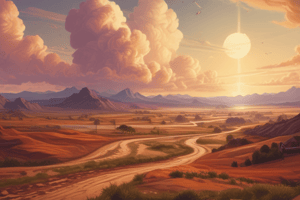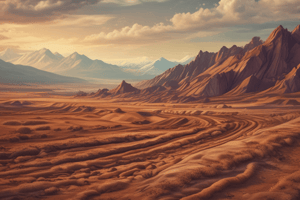Podcast
Questions and Answers
किस कारण विभिन्न धरती के क्षेत्रों में मिट्टी उत्पन्न होती है?
किस कारण विभिन्न धरती के क्षेत्रों में मिट्टी उत्पन्न होती है?
- समुद्री तटों पर जल से पार
- वायुमंडल का प्रभाव (correct)
- मानवी प्रभाव
- जैविक घटनाएं
किस क्रिया से किसान नये मिट्टी की परतें उत्पन्न करता है?
किस क्रिया से किसान नये मिट्टी की परतें उत्पन्न करता है?
- हल (correct)
- पानी से भरना
- सीलन
- उखाड़
किस कारण से कृषि में सुरक्षित मिट्टी की जरुरत होती है?
किस कारण से कृषि में सुरक्षित मिट्टी की जरुरत होती है?
- प्राकृतिक आपदाएं
- मौसम परिवर्तन
- सामरिक सुनिश्चिति
- मानव संवेदनशीलता (correct)
किस प्रक्रिया का उपयोग किसानों ने परम्परागत रूप से बुनियादि मिट्टी में बीज बोने में किया है?
किस प्रक्रिया का उपयोग किसानों ने परम्परागत रूप से बुनियादि मिट्टी में बीज बोने में किया है?
किस क्षेत्र में मिट्टी से संबंधित जानकारी से ज्यादातर महत्वपूर्ण होती है?
किस क्षेत्र में मिट्टी से संबंधित जानकारी से ज्यादातर महत्वपूर्ण होती है?
किसका कारण होता है धातु विघटन (chemical weathering)?
किसका कारण होता है धातु विघटन (chemical weathering)?
स्थूली (Soil) का मुख्य स्त्रोत क्या है?
स्थूली (Soil) का मुख्य स्त्रोत क्या है?
स्थूली का निर्माण किसमें से प्रमुख रूप से होता है?
स्थूली का निर्माण किसमें से प्रमुख रूप से होता है?
प्राकृतिक प्रक्रियाएं स्थूली के निर्माण में कैसे सहायक होती हैं?
प्राकृतिक प्रक्रियाएं स्थूली के निर्माण में कैसे सहायक होती हैं?
स्थूली का निर्माण मुख्य रूप से किस प्रक्रिया से होता है?
स्थूली का निर्माण मुख्य रूप से किस प्रक्रिया से होता है?
Flashcards are hidden until you start studying
Study Notes
Soil is the foundation of agriculture and plays a crucial role in supporting life globally. To understand its importance, we must delve into the complexities of soil formation and the processes involved in creating this essential resource.
Soil formation primarily involves physical weathering, chemical weathering, organic matter accumulation, and soil development. Physical weathering occurs when rocks break down due to mechanical forces like ice wedging, abrasion by water or wind, and temperature changes. Chemical weathering involves rock deteriorating chemically due to reactions with acidic rainwater containing carbon dioxide and sulfur compounds, among other factors. Organic matter accumulates through decomposition from plants and animals, which eventually become part of the soil, providing nutrients and enriching it further.
Soils also evolve over time based upon what happens near them. Some soils form where there's been volcanic activity; others develop under forests, grasslands, deserts, marshes, bogs, and deserts; still more might result from human activities such as farming. Additionally, different types of land may create different kinds of soils—for example, wetland soils tend to have high levels of soluble salts, while desert soils usually have low moisture content.
In addition, certain natural processes contribute to soil formation. Among these are the mixing of clay minerals during erosion events, the action of the atmosphere on surface materials, including dust storms, and the effects of climate change such as increasing soil temperatures leading to increased rates of dissolution and mineralization.
However, soil also forms because people want to make things grow better. Farmers till fields to turn up new layers of earth beneath old ones. They plow, they dig, and then they plant seeds directly into their newly tilled ground. This process has helped farmers increase crop yields substantially since ancient times. In fact, many modern farming practices were developed specifically to improve soil quality.
Soil scientists study all aspects of soil creation, composition, and properties. Their work focuses heavily on understanding how various agricultural techniques can affect the health of farmland and ultimately lead to improved food production around the world. By studying soil evolution, scientists hope to help farmers produce crops efficiently without harming the environment or depleting resources.
In conclusion, soil formation is a dynamic process influenced by numerous factors ranging from geological occurrences to human intervention. Its complexity highlights the importance of proper management and conservation efforts to ensure healthy soil conditions for sustainable agriculture in the future.
Studying That Suits You
Use AI to generate personalized quizzes and flashcards to suit your learning preferences.



